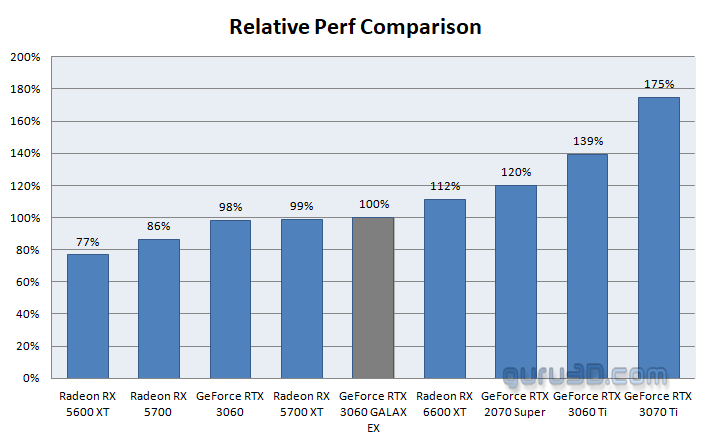Final words and conclusion
Final words
Graphics cards are an exotic product to obtain these days, and this EX White version will likely be even harder to obtain as it's targeted in Asia and the USA predominantly and being limited to a number of units as well. Also do keep in mind you'll spot the came cards in the EU under the KFA2 branding. Let's first cover the defaults. When it comes to graphics cards, the GeForce RTX 3060 remains to be a compelling option if only it could be obtained for the claimed price of 300~350 USD. The reality is that the world is a place where component shortages and cryptocurrency miners have hogged every GPU they can get their hands on, also COVID is driving higher demand for home PC gaming. All of these elements combine to create an absurd concoction of shortages and price increases. NVIDIA did impose a restriction for miners for the 3060, which should hopefully be beneficial. The performance of the card series as a whole is only passable at best. We do want to point out that the performance varied quite a bit depending on the game title. Overall, I'd say the RTX 2070 and the Radeon RX 5700 series from Team Red are the closest contenders in terms of performance (albeit they lack DXR, DLSS, and 12GB of memory). However, while we had hoped that NVIDIA would have enabled the whole shader processor stack, this is not the case, and as a result, the performance is sometimes seen to be lacking for a product at this price point. For this reason alone, the GeForce RTX 3060 Ti would be my first choice over the non-Ti mode, despite the fact that it has less graphics memory than the former. Although the GeForce RTX 3060 is a product series that we can still suggest if the price is good, we do not recommend it for those looking to spend more than 300 to 350 USD on something that has x060 in its name.
NVIDIA never offered a reference 3060 product, hence the base RTX 3060 entry was simply downclocked to reference clock speeds, as shown in the figure above. A performance gap of about up to 2 percent is revealed on a spread of games at 2560x1440, according to this analysis. Depending on the resolution and gaming application, you could achieve a 3 percent or 4 percent hit rate. Based on a 100 FPS average spread, this means that the (average) difference between the reference and fastest cards is approximately 2 to 4 frames per second. It does, however, offer performance levels in that RTX 2070 range, with the added benefit of 12 GB GDDR6 graphics memory included, and that I deem to be a sweet spot for the gamers that have a monitor with a resolution of up to 2560x1440. For some easier on the GPU gaming titles, Ultra HD is in reach with DLSS as well. It's simply going to appeal to many people as drop it in, connect it, install a driver, and frag away. I like that. And if you want a bit more bling inside that rig, hey there are other options. Let's break down the test results though.
Cooling & acoustic levels
You've seen the FLIR images; the card is hardly even lighting up, nothing to be concerned about at this point. Temperatures under stress load are around sub-65 degrees Celsius, which is excellent. Acoustics; you can hardly hear the card, but only at regular levels of intense gaming. There are significantly more competing products available on this front than there are on the previous one when it comes to acoustics but at 35~36 DBa, you're there already.
Energy
More recently, we changed the way we measure power consumption to bring you more precise numbers. Pulling manufacturer registers with 3rd party software creates the problem that you never know precisely what you are measuring. TGP versus TDP versus TBP. With our new methodology, we accurately measure the graphics card's power feeds, that's the PCIe PEG connectors and PCI-Slot. As such, we display the total board power. I mean, you can measure the GPU solely (TGP), but you also feed other components, like Memory, ICs, and let's not forget cooling and RGB. This card reveals a typical gaming power draw of 172 Watt (typical).
Coil whine
The card exhibits only insignificant amounts of coil squeal, very little, and it's hard to hear. In a closed chassis, that noise would fade away in the background. Graphics cards all make this in some form, especially at high framerates; this can be perceived.
Pricing
The generic MSRP of the GeForce RTX 3060 sits at the 329 USD marker. This card costs 349,- (at least it should be priced like that). The market however versus shortages dictate final pricing, there's little else we can say about that.
Tweaking
It is possible to manually push the card beyond its factory clock frequencies. Memory speeds of 16 to 16.5 Gbps are easily achievable, with Boost speeds of 100+ MHz or more, and for the lucky few, even a notch higher (this is on top of the factory optimization). Unfortunately, the power limiter is locked. Increased power budget typically enables the GPU to perform what it does best: accelerate the process of rendering images. When combined with the changes mentioned on the OC page, you should be able to achieve a boost frequency in the range of 1950~2050 MHz. It prefers more air to breathe since the 3060's memory bandwidth is limited by the 192-bit wide memory bus on which it operates. With the 1.70 Gbps (effective data rate) optimization, we were able to implement, you will notice a significant increase in performance. When used in conjunction with the turbo in the ~2000 MHz range. Keep in mind that values vary depending on the workload and, consequently, the game title. Remember that in order for our change to be considered real, it must pass four games in a full benchmark run at Ultra HD in order to be considered reliable.
Conclusion
Other than a locked power limiter the card performs excellently. As opposed to a tweak closer to 10% we end up at roughly 5% additional performance when overclocked. The rest is all the same really. As a product we have little to complain about it, the acoustics are good as well. The general look of the card is interesting in that white design. The performance is equal to a notch above baseline, and if you make a manual change to it (tweak), you'll see an increase of at least 5 in overall performance. The 12 GB GDDR6 is an excellent value that will last you well for at least a few years in terms of VRAM requirements. The performance does not disappoint; in fact, I would say that it is basically on par with an RTX 2070, which is the best comparison I can think of. If you stick with a resolution of 2560x1440, you'll be able to play some games that use Hybrid raytracing as well. While we don't care about raytraced shadows in the least, it's the clarity of the raytraced reflections that make the difference for me. Take, for example, driving through London in Watch Dogs: Legion or looking at water and fire reflections in Battlefield V; these are the types of things that create a noticeable difference. In order to get the most out of it, you'll get DLSS 2.0 compatibility in your video games as well. All of these variables have already been incorporated into the RTX 3060 for your convenience. Certainly, the card is not a powerhouse, but it is very capable of allowing you to frag along at respectable framerates. The EX White edition GeForce RTX 3060 is a nice little card that delivers respectable performance in the 2560x1440 WQHD resolution domain; the cooling is certainly enough and is acoustically very acceptable. The GeForce RTX 3060 overall remains an attractive product in that 2560x1440 resolution domain, pricing and availability however remain its biggest challenge. But as far as gaming graphics cards in the WQHD range go, this one comes recommended.
Download NVIDIA GeForce drivers
Sign up to receive a notification when we publish a new article.
Or go back to Guru3D's front page
- Hilbert, LOAD"*",8,1.



